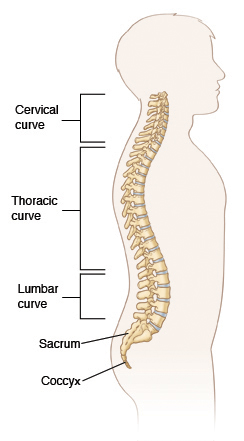Back Sprain or Strain

Injury to the muscles (strain) or ligaments (sprain) around the spine can be troubling. Injury may occur after a sudden forceful twisting or bending, such as in a car accident, after a simple awkward movement, or after lifting something heavy with poor body positioning. In any case, muscle spasm is often present and adds to the pain.
Thankfully, most people feel better in 1 to 2 weeks. Most of the rest feel better in 1 to 2 months. Most people can stay active. Unless you had a forceful or traumatic physical injury, such as a car accident or fall, X-rays may not be done for the first assessment of a back sprain or strain. If pain continues and doesn't respond to medical treatment, your healthcare provider may then do X-rays and other tests.
Home care
These guidelines will help you care for your injury at home:
-
When in bed, try to find a comfortable position. A firm mattress is best. Try lying flat on your back with pillows under your knees. You can also try lying on your side with your knees bent up toward your chest and a pillow between your knees.
-
Don't sit for long periods. Try not to take long car rides or other trips that have you sitting for a long time. This puts more stress on the low back than standing or walking.
-
During the first 24 to 72 hours after an injury or flare-up, put an ice pack on the painful area for 20 minutes. Then remove it for 20 minutes. Do this for 60 to 90 minutes, or a few times a day. This will reduce swelling and pain. To make an ice pack, put ice cubes in a plastic bag that seals at the top. Always wrap the ice pack in a thin towel or cloth to protect your skin.
-
You can start with ice, then switch to heat. Heat from a hot shower, hot bath, or heating pad reduces pain and works well for muscle spasms. Put heat on the painful area for 20 minutes, then remove for 20 minutes. Do this for 60 to 90 minutes, or several times a day. Don't use a heating pad while sleeping. It can burn the skin.
-
You can alternate the ice and heat. Talk with your healthcare provider to find out the best treatment or therapy for your back pain.
-
Therapeutic massage can help relax the back muscles without stretching them.
-
Be aware of safe lifting methods. Don't lift anything over 15 pounds until all pain is gone.
Medicines
Talk with your healthcare provider before using medicines, especially if you have other health problems or are taking other medicines.
-
You may use over-the-counter medicines, such as acetaminophen, ibuprofen, or naproxen, to control pain, unless another pain medicine was prescribed. Talk with your provider before taking any medicines if you have a chronic condition, such as diabetes, liver or kidney disease, stomach ulcers, or digestive bleeding, or are taking blood-thinner medicines.
-
Be careful if you are given prescription medicines, such as opioids, or medicine for muscle spasm. They can cause drowsiness, and affect your coordination, reflexes, and judgment. Don't drive or operate heavy machinery when taking these types of medicines. Only take pain medicine as prescribed by your provider.
Follow-up care
Follow up with your healthcare provider as advised. You may need physical therapy or more tests if your symptoms get worse.
If you had X-rays, your provider may be checking for any broken bones, breaks, or fractures. Bruises and sprains can sometimes hurt as much as a fracture. These injuries can take time to heal fully. If your symptoms don’t get better or they get worse, talk with your provider. You may need a repeat X-ray or other tests.
Call 911
Call 911 if any of these occur:
-
Trouble breathing
-
Confused
-
Very drowsy or trouble waking up
-
Fainting or loss of consciousness
-
Rapid or very slow heart rate
-
Loss of bowel or bladder control
-
Weakness or numbness in 1 or both arms or legs
-
Numbness in the groin or genital area
When to get medical advice
Call your healthcare provider right away if this occurs: